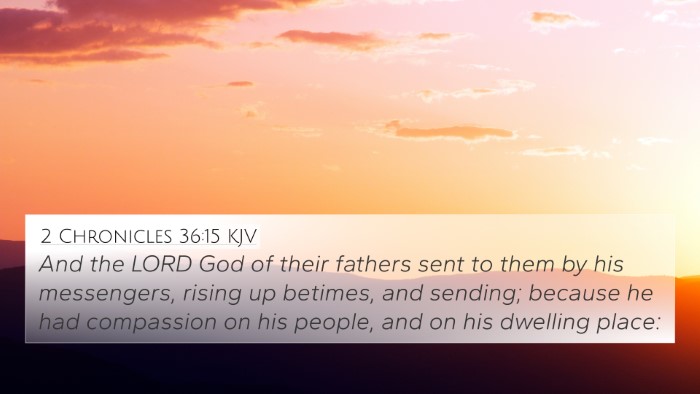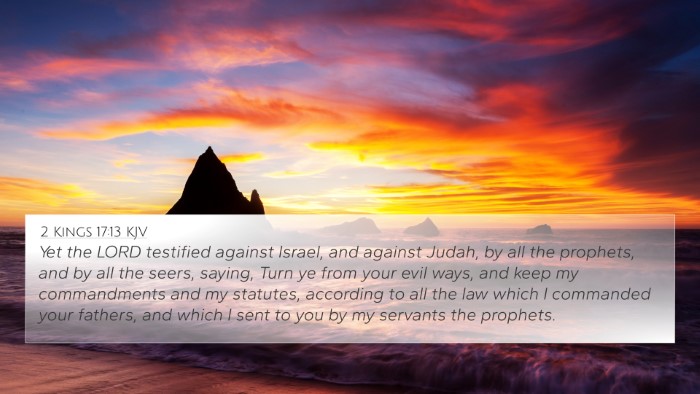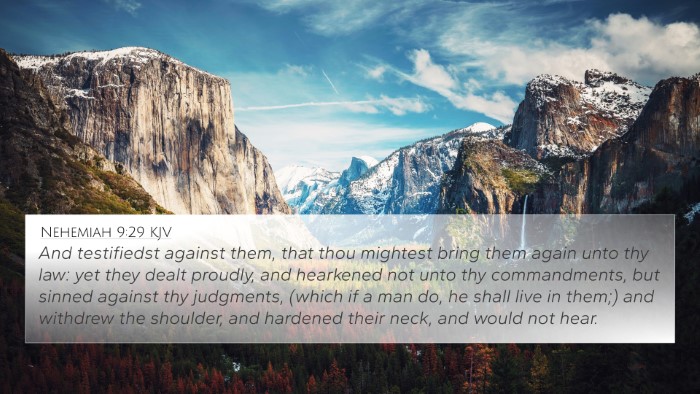Understanding Nehemiah 9:30
Nehemiah 9:30 reads: "Yet many years didst thou forbear them, and testifiedst against them by thy Spirit in thy prophets: yet would they not give ear: therefore gavest thou them into the hand of the people of the lands."
Overview of Nehemiah 9:30
This verse stands as part of a larger prayer of confession and remembrance by the Israelites, acknowledging God's continuous mercy even amid their repeated disobedience. The text reveals two primary themes:
- Divine Patience: God's long-suffering attitude towards His people.
- Prophetic Messengers: The roles of prophets in communicating God's will.
Commentary Insights
Matthew Henry
Matthew Henry emphasizes God's remarkable patience, illustrating that He has often dealt graciously with Israel despite their stubbornness. He notes the significance of the prophets as messengers who faithfully conveyed God's warnings yet faced rejection. This highlights a recurring biblical theme of God reaching out to humanity time and again.
Albert Barnes
Albert Barnes further elaborates on the unheeded warnings from the prophets, pointing out that God's Spirit moved through them, testifying of sin and calling for repentance. Barnes describes God's eventual act of allowing external nations to oppress Israel as a consequence for their unyielding hearts.
Adam Clarke
Adam Clarke takes a nuanced look at the consequences of Israel's rebellion, stating that God's righteous judgment resulted in allowing them to be taken captive by foreign powers. He draws attention to the importance of the continuity of hardship as a means for Israel to acknowledge their need for God.
Key Themes and Connections
Nehemiah 9:30 connects deeply with various biblical themes and encourages a broader understanding of scripture through cross-referencing.
- Divine Mercy: Psalms 86:15 - "But you, O Lord, are a God merciful and gracious, slow to anger and abounding in steadfast love and faithfulness."
- Rebellious Nature of Humanity: Isaiah 53:6 - "All we like sheep have gone astray; we have turned—every one—to his own way."
- Prophetic Purpose: Jeremiah 7:25 - "Since the day that your fathers came out of the land of Egypt unto this day, I have even sent unto you all my servants the prophets, daily rising up early and sending them."
- Consequences of Sin: 2 Chronicles 36:15-16 - "And the Lord God of their fathers sent to them by his messengers, rising up betimes, and sending; because he had compassion on his people, and on his dwelling place: But they mocked the messengers of God, and despised his words, and misused his prophets."
- Handing Over to Adversaries: Romans 1:24 - "Wherefore God also gave them up to uncleanness through the lusts of their own hearts, to dishonor their own bodies between themselves."
- The Role of the Holy Spirit: John 16:13 - "Howbeit when he, the Spirit of truth, is come, he will guide you into all truth."
- Call to Repentance: Acts 3:19 - "Repent therefore, and turn back, that your sins may be blotted out."
Thematic Bible Verse Connections
Many Bible verses relate to Nehemiah 9:30, showcasing the shared narrative of God's faithful perseverance amidst humanity's continual failings:
- Cross-referencing Psalm 95:10-11 illustrates God’s dismay with a rebellious generation: "Forty years long was I grieved with this generation, and said, 'It is a people that do err in their heart, and they have not known my ways.'"
- In Galatians 6:7, the principle of sowing and reaping underscores accountability: "Be not deceived; God is not mocked: for whatsoever a man soweth, that shall he also reap."
- The plea in Hosea 14:1 captures the essence of repentance, calling Israel to turn to the Lord: "O Israel, return unto the Lord thy God; for thou hast fallen by thine iniquity."
Applications for Contemporary Readers
Today, Nehemiah 9:30 serves as a reminder of the relevance of biblical prophecy, the assurance of God's mercy, and the importance of heeding divine warnings. Christians can draw strength and reflection from the following applications:
- Recognizing God's patience teaches us to value repentance and contrition in our lives.
- Understanding the role of prophetic warnings is imperative for spiritual growth and awareness of personal sin.
- The consequences of disregarding God's voice illustrate the depth of His love through corrective measures.
- Linking this verse to others enhances the understanding of God's overarching narrative of redemption and mercy.
- Contemplating the themes of forgiveness can encourage communal prayers of repentance within today's church.
The Importance of Cross-Referencing
Using tools for Bible cross-referencing helps deepen our study and understanding of scripture:
- Bible Concordance: A valuable resource to locate verses related to specific words or themes.
- Cross-Reference Bible Study: A method of engaging with scripture to discern links across both Testaments.
- Bible Chain References: Utilizing a systematic approach to connect verses based on similar themes or ideas.
- Cross-Referencing Bible Study Methods: Diverse methods can assist in drawing connections, such as thematic analysis or historical context.
Conclusion
Nehemiah 9:30 encapsulates the themes of divine patience, prophetic communications, and the consequences of disobedience. As readers explore cross-references and connections within the Bible, they gain a more profound understanding of the narrative of God's relationship with His people. Engaging with these biblical texts invites reflection and spiritual growth, affording believers a deeper appreciation for the grace and mercy offered through Christ.
























